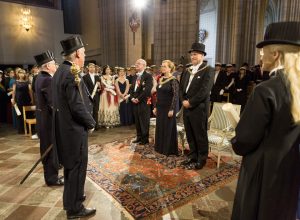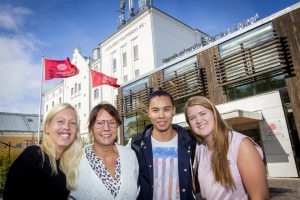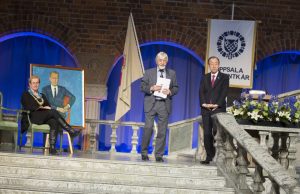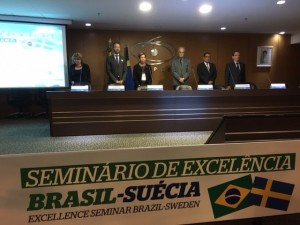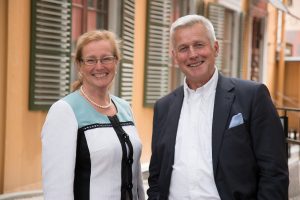Looking back at this semester, it is impressive how many things have happened at Uppsala University in just a few months. You have all contributed outstanding efforts. Thanks to all of you – skilled staff and ambitious students – the University can be an important driving force in the development of society. Our students can get a first-rate education, and in research we work together with universities and institutes around the world. No wonder we are globally recognised and ranked among the leading universities. This is something to keep in mind while you get some rest over the summer.
When we look back at the spring there are many different events that deserve to be mentioned.
At the beginning of the year we took a stance on the issue of national research evaluations in Sweden as suggested by the Swedish Research Council. We said no – due to matters of principle, quality and efficiency. The proposed system would undermine the higher education institutions’ ownership of quality matters, have limited value as basis for quality management and research renewal, and be a costly and inefficient system for resource distribution.
Instead we think the institutions themselves should have – and take – the responsibility for quality. We are proud that Uppsala University once again leads the way with its own quality evaluation – Quality and Renewal 2017. The evaluation will be completed next year, and this time we put particular emphasis on the processes that give rise to quality and renewal in our research environments.
The issue of dimensioning remains an important one. We are forced to continue our incremental cuts to the number of student places, which means that fewer of the motivated students who apply actually get to study. Even so, we welcomed 4,781 new students this spring and the number of students located at Campus Gotland has increased from 715 to 935 in two years. This is a great outcome, but we still have some way to go in order to reach our goal of 1,500 students in Visby.
The matter of dimensioning is also related to the challenges that Europe is currently facing. The University wants to, and can, contribute knowledge, creative solutions and innovations if we are given the right prerequisites. In today’s situation in Sweden, Uppsala University could contribute towards integrating newly-arrived refugees through targeted educational efforts and complementary teacher training.
Uppsala University must be internationally competitive. We work with people all over the world and are enriched when international students and researchers join us. Sadly, though, we don’t have enough scholarships to offer the non-European students who want to study here. We are pushing for both increased room for manoeuvre in internationalisation and a strong Swedish scholarship programme. While we wait for the Swedish government, we are doing what we can with the resources we have.
Those of you who read the Vice-Chancellor’s blog regularly have seen that we have travelled across the world and taken part in meetings on every continent during the spring. We do so because we know that staying in touch with our friends and alumni around the world is an important part of the equation in succeeding with our internationalisation efforts. Through international networks we make sure Uppsala University is represented in all the right forums, collaborating with those best suited in all areas.
But we also have a supportive roll for all those who want to develop and grow in countries with a weaker educational tradition. All over the world, universities play an important role in the democratic work. In collaboration with the international network Scholars at Risk we try to help create a sanctuary for intellectuals when given the opportunity. In an increasingly troubled world with severe conflicts, where freedom of speech and academic freedom are under attack, these issues become all the more important.
In research, several cross-border initiatives are being prepared and launched. Medical technology, antibiotic resistance, migration, racism, and the new working life are examples of areas where our research and knowledge can make a difference. The common denominator is that several faculties and disciplinary domains are involved.
Leading such a broad and complex organisation as a university is a privilege, but has its fair share of challenges. How to best steer and lead a university is something that has been discussed in one shape or another for as long as universities have existed. Recently the discussion was revitalised by Kåre Bremer’s inquiry, which has led to many discussions and has been a good starting point when discussing leadership matters in different forums. Is our system for leadership and management transparent and easy to understand? How can we vitalise collegiality and student influence while also creating the necessary means for clear leadership at all levels of the University? Do we need to make adjustments anywhere? Mid-spring, we handed in our comments on these issues to the government.
But all has not been work – we have had occasion to celebrate, too. Since the new year we have held two conferment ceremonies. The winter conferment ceremony became the last to be held in the Main University Building before the renovations started. The spring conferment ceremony later took place in Uppsala Cathedral, which was at least as festive as our ceremonies in the Grand Auditorium. The conferment ceremony is such a strong and important tradition that it can survive being physically moved, even if only temporarily.
We have also had several interesting meetings and conferences on housing, trafficking, and reproductive health, among others. We have welcomed many visitors to our beautiful Uppsala University. When famous people visit us, such as UN Secretary General Ban Ki-moon, we receive international attention. This is great to see, but most pleasing of all is the reason they want to come here: They want to be connected with Uppsala University and the things we stand for.
Now we would like to wish everyone a great summer and hope you all come back after the holidays, eager to accomplish many great new things!
Eva Åkesson, Vice-Chancellor
Anders Malmberg, Deputy Vice-Chancellor
Katarina Bjelke, University Director
Johan Tysk, Vice-Rector of the Disciplinary Domain of Science and Technology
Stellan Sandler, Vice-Rector of the Disciplinary Domain of Medicine and Pharmacy
Torsten Svensson, Vice-Rector of the Disciplinary Domain of Humanities and Social Sciences

